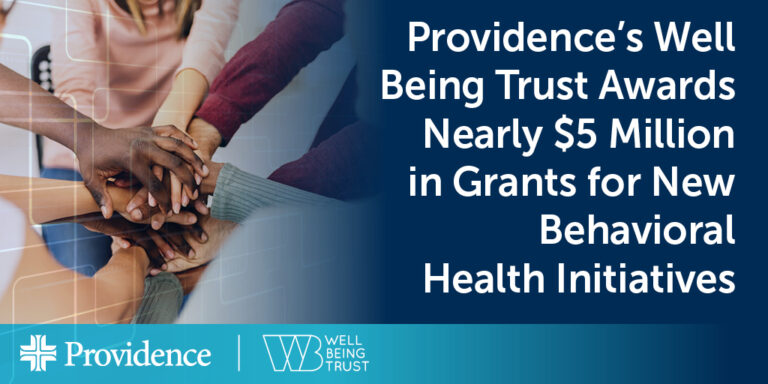
Providence’s Well Being Trust has awarded its first round of behavioral health innovation and transformation grants totaling nearly $5 million. The funds will go toward increasing access and improving the mental health and well-being of patients.
The projects funded by these grants are aligned with Providence’s Well Being Trust strategic priorities, which include expanding timely access, improving quality care and improving mental health and resilience in communities nationwide – especially for the poor and vulnerable and those most marginalized in society.
View this media advisory to read more about Providence’s Well Being Trust innovation and transformation grants. See below to learn more about the grant initiatives.
Improving Patient Care and Expanding Access

- Crisis Recovery Center/MAT Bridge Clinic – (Alaska): Expand the current clinic hours and prepare for the transition into the full-service walk-in behavioral health clinic model.
- Reducing Substance-Use Related Maternal Mortality – (Alaska): Reduce substance use disorder (SUD)-related maternal mortality and rates of infants born with SUD-related issues.
- Mobile Health Clinic Expansion (Southwest Washington): Utilize Mobile Health Clinic model to increase access to integrated behavioral and primary care for unhoused persons.
- Boarding Protocol for Pediatric Psychiatric Patients (Washington – Central Puget Sound): Improve patient emotional regulation by creating a protocol for providing activity kits for boarded pediatric patients.
- Peer Support Specialist Program (Washington – Puget Sound): Improve patient connection with treatment resources and decrease stigma by incorporating a peer support specialist into treatment programs in inpatient psychiatric and addiction recovery units.
- Increasing Access to Mental Health and Peer Support for Transgender and Gender Diverse Communities (Swedish): Partner with LGBTQIA+ community mental health providers and organizations to combat the lack of community connection contributing to poor mental health amongst trans and gender diverse communities and address lack of adequate and expedient mental health care.
- Depression Treatment-PHQ9 Follow-Up (Swedish): Pilot a protocol to distribute PHQ9 questionnaires post-index, monitor results, and support triage and treatment referrals to ensure positive depression treatment response.
- Collaborative Problem-Solving Implementation (Oregon): Improve behavioral regulation patterns in youth by training staff at Portland behavioral health facilities in the evidence-based Collaborative Problem-Solving model.
- Depression Screening, Suicide Risk Assessment and Safety Planning Training for Caregivers and Providers (Oregon): Increase depression and suicide risk screenings for approximately 450,000 patients annually.
- Fostering Emotional Resilience Among Latinx Caregivers (Oregon): Increase caregiver access to mental wellness content and resources through the integration of culturally adept resources.
- Providence Inland Northwest Foundation/Integrated Behavioral Health Services Expansion (Spokane): Increase access to approximately 29,300 patients, ultimately reducing ED utilization, emergent mental health issues, and suicide rates.
- Kadlec Regional Medical Center/Integrated Behavioral Health Expansion: Expand access and improve depression screening, follow-up, treatment and response by embedding licensed social workers in primary care clinics.
- Providence St. Patrick Hospital/Crisis Receiving Center (Missoula, Montana): Support launch of the new crisis receiving center, which will provide a safe space and trauma-informed care for people experiencing a behavioral health crisis.
- Expanding Behavioral Health Integration into Pediatric Offices (Sonoma County, California): Embed a behavioral health provider into pediatrics in order to offer evidence-based interventions, connect patients with community resources, assess and address suicide risk, and provide annual depression and ACES screenings.
- Increase timely access to medication assisted treatment and substance use disorder services (Napa, California): Permanently embed a Substance Use Navigator and Medication Assisted Treatment into the ED to provide initial intervention to patients with a substance use or opioid use disorder and connect them to ongoing services.
- Medication Assisted Treatment Enhancement Program (Southern California): Increase capacity to evaluate, treat and manage people presenting with opioid use disorders.
Supporting our Youth

- Covenant Children’s Relational Behavioral Health Improvements (Lubbock, Texas): Support opening of the region’s only children’s outpatient behavioral health unit which will include a full range of outpatient services; intensive outpatient therapy; partial day hospitalization; social work support; and telehealth resources.
- Covenant Health System/Anti-Stigma Communications Campaign (Lubbock, Texas): Implement an anti-stigma social-media/communications campaign to address the adolescent mental health crisis.
- Expansion for Pediatric Behavioral Health Services (Southern California): Extend pediatric behavioral health services to pediatric population through addition of behavioral health therapists who will work with psychiatric consultants and care coordinators to support six clinics.
- Kadlec Regional Medical Center/Mental Health Promotion and Education (Richland, Washington): Address mental health promotion and stigma reduction in the youth population by partnering with school districts and community organizations to provide education, evidence-based curriculum, and information dissemination.
- Renton School District/Student Mental Health Services (Renton, Washington): Increase access to school-based mental health services and utilize Work2BeWell curriculum to promote mental health education.
- Tele-Behavioral Health Services for Students (Burbank, California): Provide students with clinical risk assessments and mental health programming (parent education, faculty/staff professional development and programming consultation).
- Thriving Together (Southern California): Bringing Work2BeWell school-based mental health resources to high-need high schools.
Coming Soon: New Work2BeWell Curriculum based on the acclaimed PBS documentary "Hiding in Plain Sight"
Work2BeWell recently announced an exciting partnership with Ewers Brothers Productions to develop a cutting-edge curriculum based on the acclaimed documentary “Hiding in Plain Sight.”
This supplemental curriculum (7-12) will include 24 lessons packed with engaging discussion topics, hands-on activities and thought-provoking questions. Designed for educators, teens and counselors, this innovative curriculum will bring awareness to mental health.
Providence’s Well Being Trust is honored to help drive this important work that advances the mental health and well-being of our youth.
Learn more here: HIPS – Work2BeWell.


